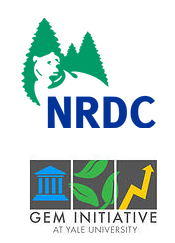At a conference organized by the Natural Resources Defense Council (NRDC) and the Governance, Environment, and Markets (GEM) Initiative at Yale University, UN Member States, officials and stakeholders explored means of implementation for the post-2015 development agenda and potential 2015 agreement in the UN Framework Convention on Climate Change (UNFCCC), and discussed how networks of diverse actors can respond effectively to global challenges.
 2 November 2013: At a conference organized by the Natural Resources Defense Council (NRDC) and the Governance, Environment, and Markets (GEM) Initiative at Yale University, representatives from UN Member States and other stakeholders explored means of implementation for the post-2015 development agenda and potential 2015 agreement under the UN Framework Convention on Climate Change (UNFCCC), and discussed how networks of diverse actors can respond effectively to global challenges.
2 November 2013: At a conference organized by the Natural Resources Defense Council (NRDC) and the Governance, Environment, and Markets (GEM) Initiative at Yale University, representatives from UN Member States and other stakeholders explored means of implementation for the post-2015 development agenda and potential 2015 agreement under the UN Framework Convention on Climate Change (UNFCCC), and discussed how networks of diverse actors can respond effectively to global challenges.
‘Rio+20 to 2015: A New Architecture for a New World’ was hosted at the Yale School of Forestry and Environmental Studies in New Haven, Connecticut, US, from 1-2 November 2013. Participants considered the effectiveness and accountability of partnerships between diverse actors and voluntary commitments for sustainable development. In opening remarks, Jacob Scherr, NRDC, stressed the need for a new architecture for international agreement and action that is inclusive, flexible, and produces results. Ben Cashore, Yale University, highlighted the strategic implications of emerging coalitions for sustainability issues, and called for analysis of causal mechanisms regarding how coalitions emerge and become durable.
On structuring effective commitments from both state and non-state actors, Nikhil Seth, UN Department of Economic and Social Affairs (DESA), emphasized the large number of voluntary commitments made by diverse actors at the UN Conference on Sustainable Development (UNCSD, or Rio+20). Celine Ramstein, Embassy of France to the US, stressed that, for these commitments to be accountable, they must be flexible, organized around thematic clusters, well defined, accessible and well enforced. Celeste Connors, Johns Hopkins University’s School of Advanced International Studies (SAIS), recognized that governments cannot do everything themselves, and must coordinate with existing frameworks and opportunities in diverse fora.
On climate, Thomas Christensen, Executive Office of the UN Secretary-General, looked forward to the possibilities of the UN Climate Summit in 2014 to gather diverse actors to make commitments ahead of negotiations for a new legally binding climate treaty. He said multi-stakeholder partnerships will be an important way to “bridge the gap” between climate and poverty goals. Ambassador Ronald Jumeau, Seychelles, discussed the unique challenges posed to small islands with the onset of climate change, and their efforts to find coordinated solutions through the Global Island Partnership (GLISPA). In a video message, Christiana Figueres, UNFCCC Executive Secretary, said no global issues will be solved by a top-down approach alone, and that solving climate change is the responsibility of the global community, not just governments. Laurence Tubiana, Institute for Sustainable Development and International Relations (IDDRI), said governments, business and civil society should work together with a sense of “contract” to leverage climate-related initiatives, as all are responsible.
On the post-2015 development agenda, Jorge Laguna-Celis, Office of the President of the UN General Assembly (UNGA), said a new agenda must have an enabling framework for implementation, and a coherent review and monitoring mechanism at its center. He stressed that goals will need clear standards for accountability between governments, the UN system and outside actors, and thematic partnerships for the achievement of each goal. Ken Abbott, Arizona State University, introduced the theory of orchestration, in which governments support other actors that possess the capabilities and resources they need to accomplish collective public goals. Navid Hanif, UN Department of Economic and Social Affairs (DESA), said reality often moves much faster outside of the UN, and that multiple levels of accountability are necessary for a new and effective architecture of partnerships for development.
A keynote address from Jeffrey Sachs, Sustainable Development Solutions Network (SDSN) and Columbia University, highlighted linkages between the climate agenda and the post-2015 development agenda. Saying the two processes are “politically co-dependent,” Sachs stated that a climate agreement cannot be reached unless developing countries have confidence that it will be part of a strong new development framework. He noted that two years remain to cultivate a new level of trust and leadership between countries within both processes. Sachs also stressed that agreements must facilitate deep transformation of current systems.
Breakout sessions addressed oceans, forests, energy, cities, and how current partnerships and action networks are advancing sustainable development in those areas. Other discussions over the two days focused on financing and green economy, education for sustainable development, and cultural and spiritual aspects of sustainability.
Summarized proposals are expected to be distributed during the UNFCCC negotiations and the UNGA’s Open Working Group (OWG) on (SDGs). [IISD RS Sources] [Conference Website] [Video Remarks]